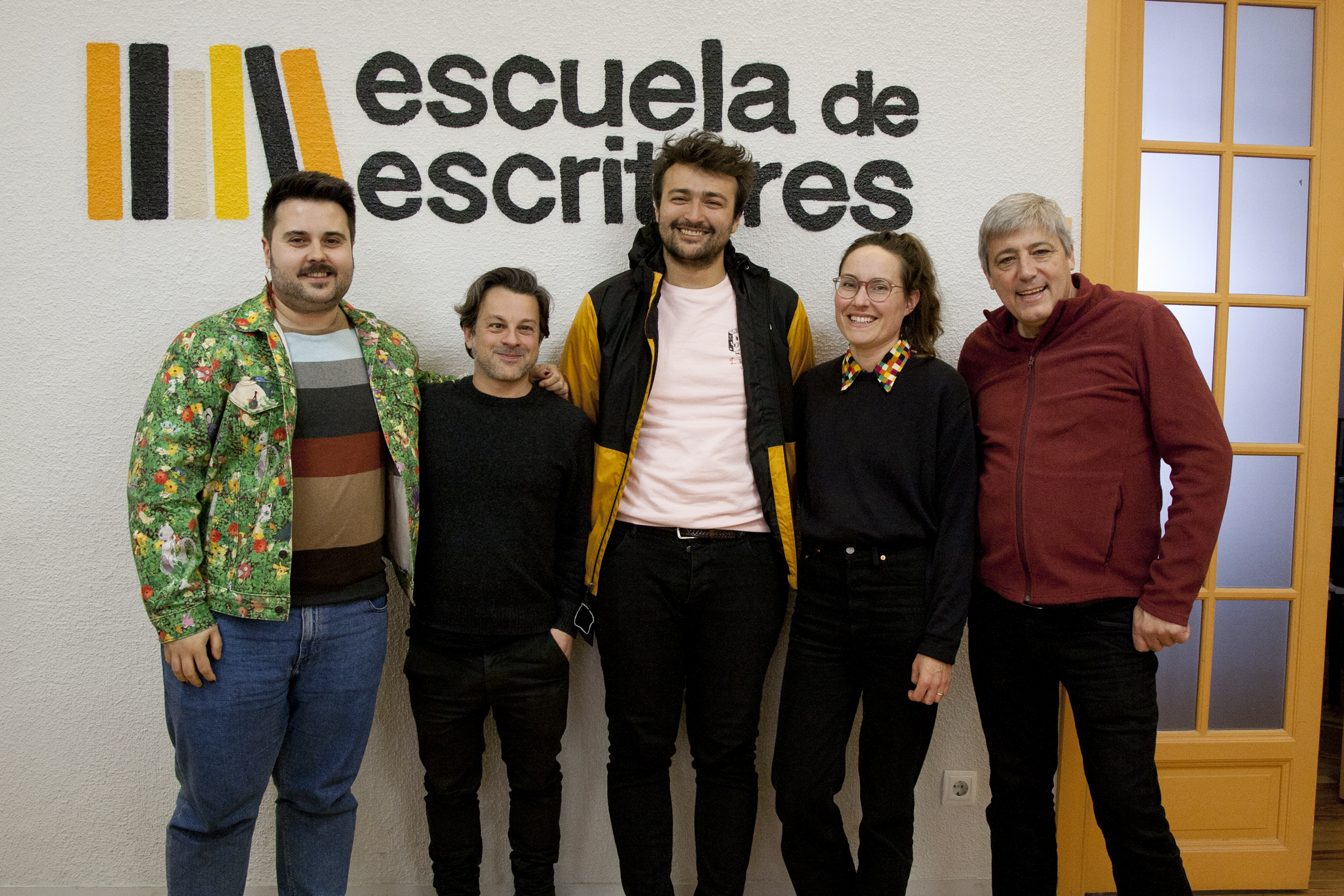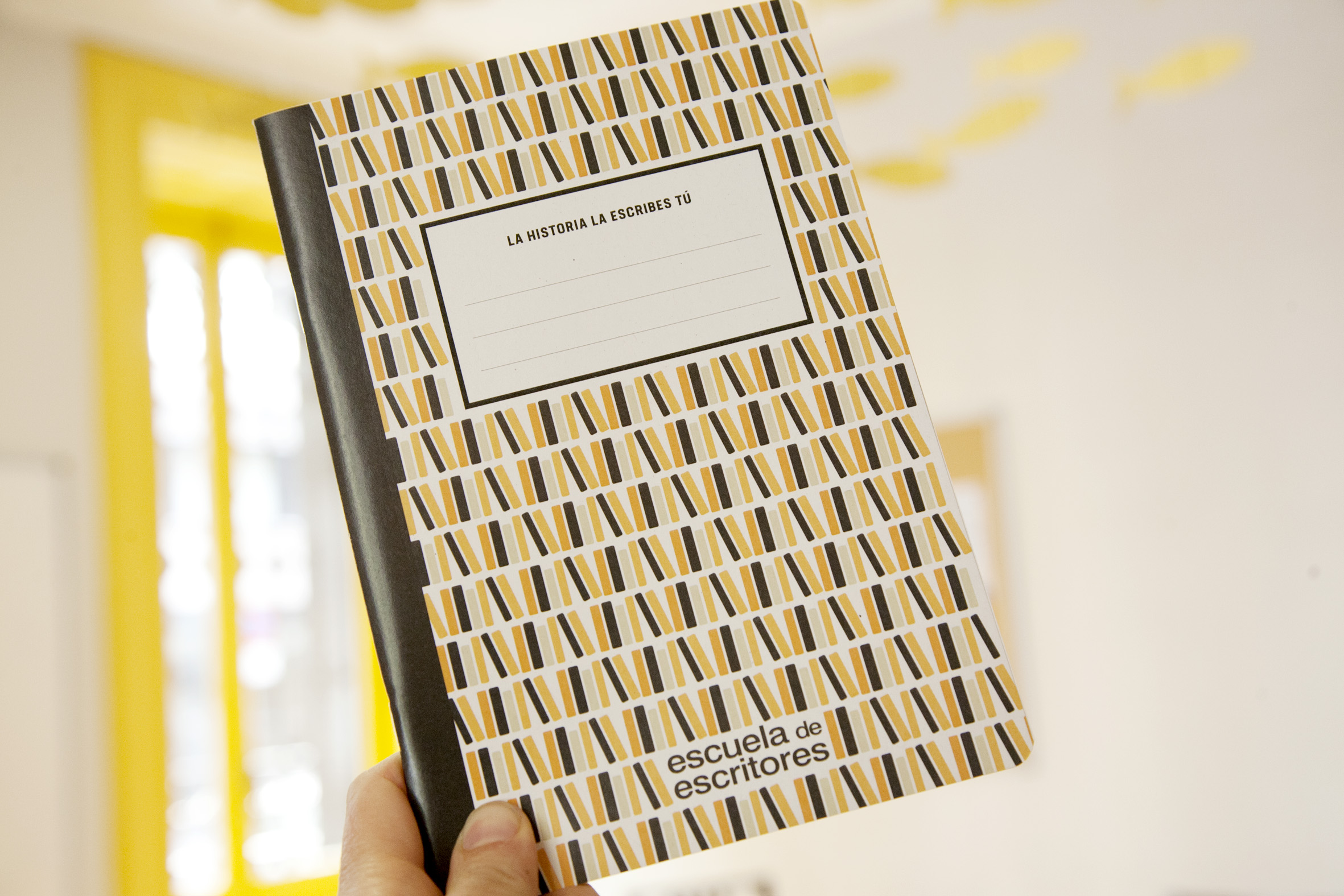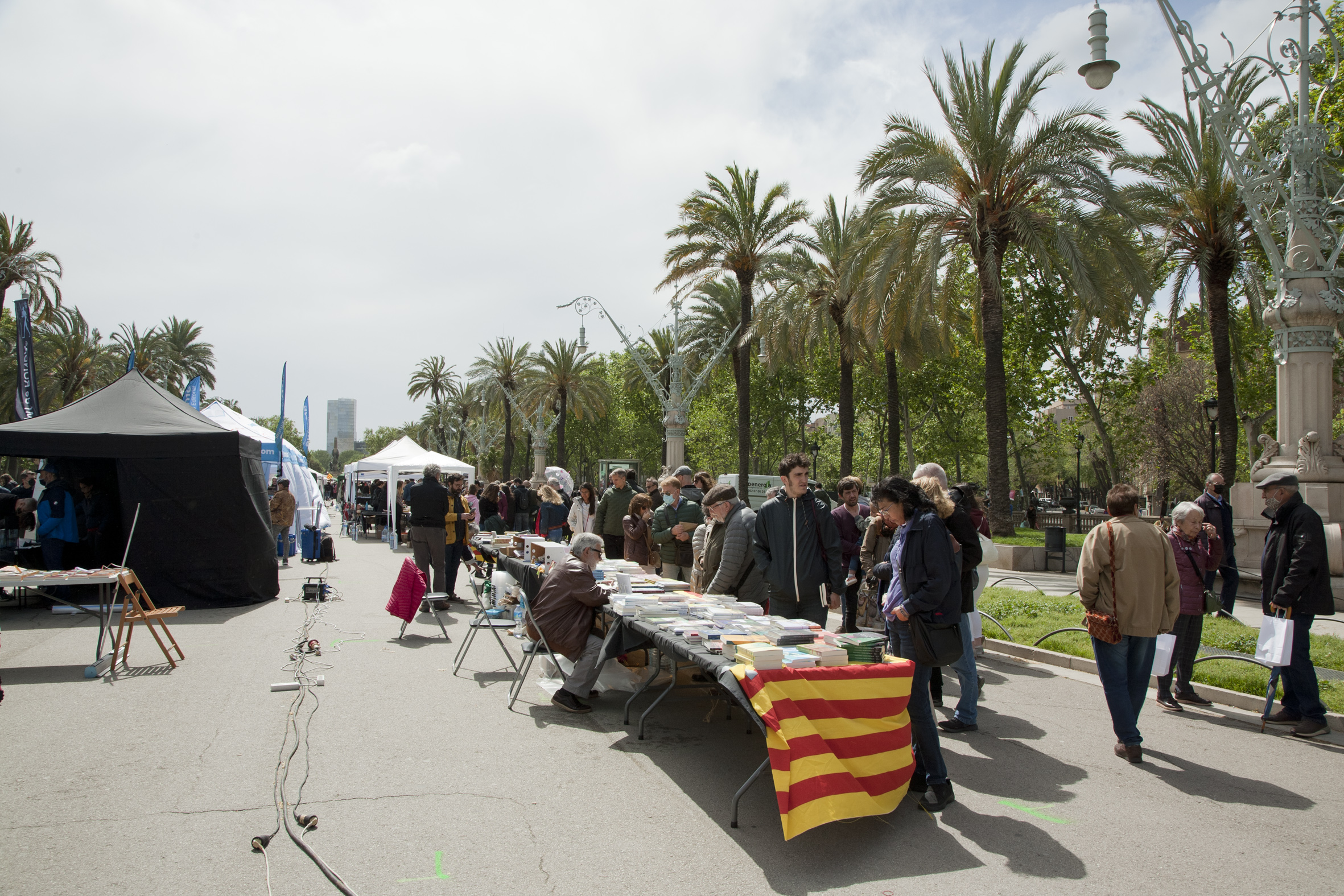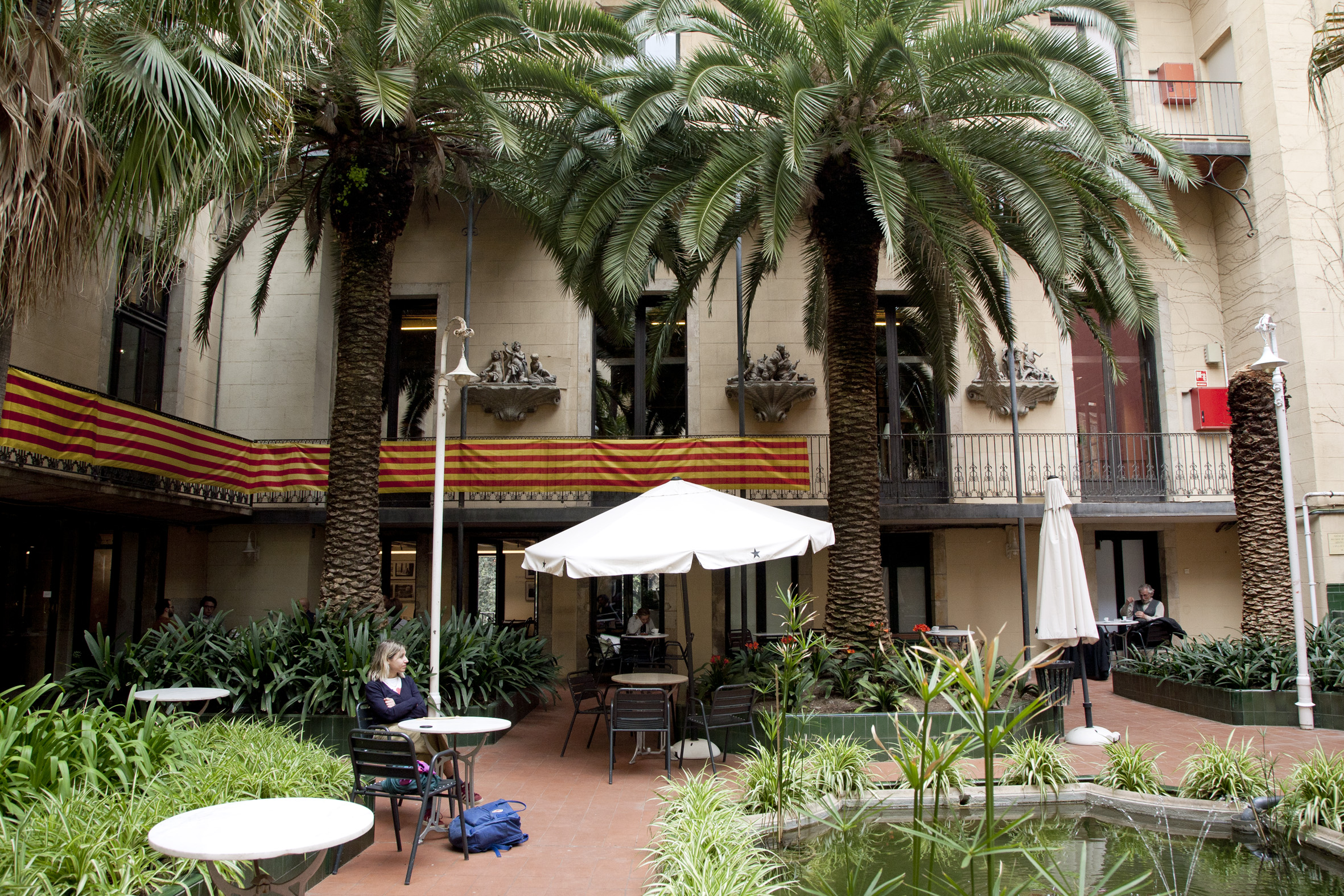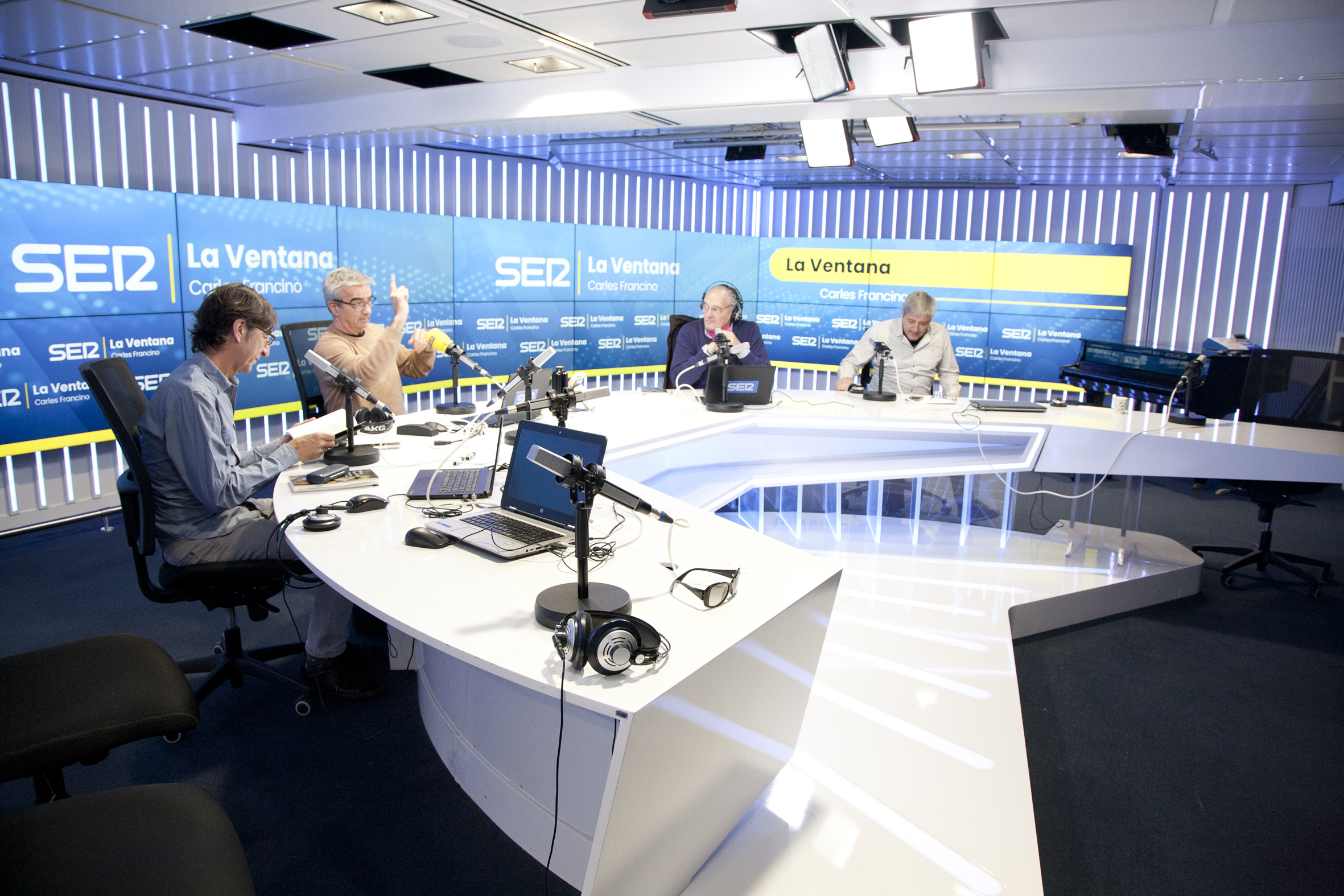Job Shadowing at Escuela de Escritores – By Marianne Hommersom, LP
LP Job Shadow / Marianne Hommersom at Escuela de Escritores / 20-29 april 2022
The impressive all-marble entrance of Madrid’s Escuela de Escritores (EdE) gives way to a homey atmosphere. Inside the writer’s school, classrooms are named after literary characters like Anna Karenina and Gregor Samsa. I’m standing under a bright school of fish hanging from the ceiling in a warm yellow corner room dedicated to Aureliano Buendía from Gabriel García Márquez’ classic One Hundred Years of Solitude. I’m here to ‘job shadow’ even though a schedule filled with meetings and visits doesn’t exactly tell me what that means. I know that shadowing is a detective’s job and decide to act accordingly, asking questions and gathering clues about Spain’s literary scene. The Dr. Watson to my Sherlock Holmes is the overworked but dapperly dressed Project Manager Alejandro Marcos who doesn’t only show me around, but who turns out to be an expert on the very specific time zone that is known as Spanish Time, where ‘afternoon meetings’ don’t start before 6 PM.
***
Director Javier Sagarna wants his students to experience the Escuela as a bubble where they can escape their daily worries. Over the next couple of days, I’ll meet most of the staff, and we’ll sit down to talk about what they do. And coincidence or not, whether working at the front desk, coordinating the website or being head of studies: pretty much all of them are writers who share a long history with the Escuela.
From its start in 2003, the school has offered an extended range of online classes, even developing their own Virtual Classroom and offering the only official ‘creative teaching’ course in Spain via online education. A number of courses take place inside the school’s building, scheduled mostly in the evening to allow for the combination with a daytime job. Currently, the school is well equipped with screens and sound systems to teach in a hybrid way. Later this week, I’ll join some classes to experience how well the dynamics work between teachers and students, in the classroom or behind their laptop in, for instance, Mexico.
Although my Spanish is not good enough to fully understand everything being said, I get a good impression of the students’ interaction during a reading and feedback class of the master students, supervised by Javier and Literary Professional Daniel Montoya. Working with young writers in a talent development project at deBuren, I’m always interested in seeing how group dynamics are dealt with elsewhere. After a round of ‘what did you do since the previous meeting’, including specifics about the amount of words written, each student reads an excerpt from his or her new material and asks for feedback.
‘It can be tempting’, Daniel reflects, ‘to focus very critically on minor details in texts that are already well-developed, unintentionally giving the author the impression that there is still a lot to work on, when in fact it’s only a matter of finetuning the story.’
The open atmosphere that he and Javier create, allows for sharing both positive and critical thoughts about the texts. Does this dialogue work? Is that the right tone for your character? How about changing this specific word? Laughter regularly lightens up the serious talk; the wine and cake from Salamanca brought by one of the students has a similar effect.
***
Although no one is overly enthusiastic about the usual style of book presentations (‘always the same’), ‘everyone’ seems to cherish them now that mouth mask restrictions have been lifted in Spain. CELA regular Pablo Mazo takes me around town to visit some independent bookstores. At Librería Antonio Machado we meet Sol Salama, who established independent publishing house Transito offering a fine selection of international female authors. I’m happy to hear she’ll be joining the speed date session with CELA translators pitching ‘their’ CELA authors to Spanish publishers scheduled a few days later.
I was already familiar with the concept of bookstores serving coffee, but perhaps having a glass of wine amidst the bookshelves is even better. At Tipos Infames, I’m invited to share a drink with a couple of writers visiting Madrid. Proudly showing their latest publications, the conversation with Begoña Méndez and Nadal Suau from Mallorca drifts on to the current situation of Catalan language literature and why, from a historical perspective, Catalan poetry has a much longer tradition then prose. Also at the table is Escuela alumni Natalia García Freire from Ecuador, sharing her experiences on Zoom classes and the pros and cons of living far away from the literary bustle. Pablo shares his experiences as a publisher and we discuss how current times seem to inspire quite a few author to write stories set in a near future, finding interesting ways to address, for instance, mayor themes like climate change.
***
To broaden my perspective on the Spanish literary scene, I spend a few days in Barcelona where I am warmly welcomed by Míriam Garcia of the Escola d’Escriptura. The Ateneu building is amazing, a former palace with an impressive historic library and a courtyard garden with palm trees, where we sit down for tea. Although still reserved for members, it is currently far more accessible than during the early days when it was still a society club. The Escola’s students automatically get membership and access to the building’s facilities.
Contrary to the school in Madrid with its extended program of online courses, the students at Escola d’Escripturas come together in the actual classrooms. A masters program isn’t available, as there is in Madrid, but many students work towards a novel during a four year program. Míriam tells me many of them take additional courses afterwards and are true regulars of the school. On an impressive banner in the entrance hallway, I get an overview of the book publications of former students of just the past year: over a hundred novels, children’s books, collections of poetry and works of non-fiction. The Escola keeps a close connection with EdE and other writing schools around Europe as a member of the network of European Association of Creative Writing Programmes (EACWP).
The love for books is on its best display during my time in Barcelona, as it is San Jordi, or ‘Book day’. Traditionally, you give a book or a rose to your loved ones. Many of the iconic historic buildings, such as Gaudí’s famous Casa Batlló, are decorated with splendid roses. After two years of covid restrictions, streets all over the city are now bursting again with book stalls of the many Spanish publishing houses and bookstores. Crowds of book lovers young and old stroll around the streets, listening to performances or buying books and having them signed by the many authors present. The atmosphere is wonderful and relaxed, even though the bright sunny day is interrupted by some intense rainstorms that ruin the books at several bookstalls.
***
Back in Madrid, I join Javier on his weekly appearance in the SER radio show La ventana de los libros. One hour of book talk on the national radio in prime time. I’m amazed. At the radio studio, I get a fantastic view over Madrids skyline plus a first row view of the smoothly run broadcast, with host Carles Francino easily switching between subjects and guests in the studio and on the phone, moving his expressive eyebrows and elegant hands as if conducting an orchestra. Together with the EdE, the long running and popular writing contest Relatos en Cadena is organised. Each week, Javier announces the winning one-hundred-word story.
Later that evening, enjoying tapas, Javier explains his drive to start a writing school, and the dream he has for Escuela de Escritores to continue to grow and to be regarded as the creative writing school of Spain, or even for all the Spanish speaking countries. He is convinced of the importance for writers to be readers too: by reflecting on literature, on the techniques used by the best, one can develop one’s own style.
***
A ‘laboratory of writing’, that is the spirit Ignacio Ferrando is trying to create as head of the masters program. He shows me graphs and charts of all possible aspects of the school; I’m glad that the dry percentages and numbers are brought to life by Ignacio’s vivid explanation. The goal is not just to ‘create writers’, but for the students to figure out ‘how to be a writer’. That’s why the school doesn’t just engage teachers who are writers, but also philosophers or art critics. It’s also why a monthly guest lecturer from another domain such as performance or music gets the students out of their comfort zone, and why renowned international authors (for instance Jonathan Franzen and Enrique Vila-Matas) are invited to give masterclasses: this ‘intellectual bombardment’ should stimulate the writing technique, creativity and most of all the sensitivity of the students.
***
It is a wonderful experience to let your mind associate freely during a lecture in a language you understand only partially. While Enrique Paez talks, I gather that he’s giving concrete tips and tricks on ‘desbloquear’ as a writer, but what I really hear is how one should ‘fight your inner critic like a profound cow’ and that you should ‘listen to your characters while looking at an intense fruity moon’. He did really round off the lecture by saying that anyone can learn to tell things in a way appealing to many, but that it are the great writers who actually have something to say.
***
Although there are several printed literary magazines in Spain, the situation seems quite different from that in the Low Countries, where it is common practice for upcoming authors to publish their short stories or poetry in literary magazines, and gaining visibility and reputation – and attention from publishing houses or invitations to perform – based on this printed or digitally published work.
I’m giving Fernando Clemot, director of Quimera, one of the oldest remaining printed literary magazines, a bit of a hard time having him explain the Spanish situation to me, as I seem unable to wrap my head around it. But perhaps my confusion just stems from our different expectations as readers of magazines: to him, the essays and literary critiques are most relevant and he’ll skip the short stories or poetry, whereas I read these magazines mainly to discover new artistic contributions.
Asking about publication possibilities for upcoming writers, Humberto Franco, of the EdE Alumni Association, shows me La Gran Belezza and Fabula, two examples of magazines that focus on prose and poetry in carefully designed publications. Humberto also makes sure that La Rompedora, the online magazine of EdE, publishes either prose, poetry, interviews or news from and about students and alumni on a daily basis.
Humberto - hair combed into a subtle Elvis tuft, personalised belt around the hips – takes his job of maintaining the alumni-network to heart. Our one-hour meeting turns into a three-hour conversation as we compare the different ways in which we try to keep in touch with a growing network of writing alumni connected by a school, or in my case, a writing residency. After two years of mainly online promotion (interviews, sneak-peek publications of a first chapter of a new book), Humberto is excited he’ll soon be able to ‘gather the herd’ again, organising live performances and parties. I have no trouble imagining him making connections, expanding the network.
***
On my journey home, my notebook filled to the brim, I think of my long conversation with Javier, talking about this amazing urge so many people feel to write a novel. Playing the devil’s advocate, I ask if he doesn’t think there are just too many books published. ‘Well’, he replies, ‘there might be too many books, but there can never be too many writers.’
